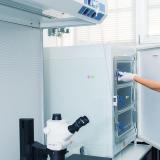The Australian Government is now in caretaker period. During this time, updates on this website will be published in accordance with the Guidance on Caretaker Conventions, until after the election.
The Ethical guidelines on the use of assisted reproductive technology in clinical practice and research 2017 (updated 2023) (the ART Guidelines) are used by professional organisations to set standards for the practice of assisted reproductive technology (ART). The ART Guidelines are primarily intended for ART clinicians, clinic nurses, embryologists, counsellors and administrators, researchers, Human Research Ethics Committees (HREC) and governments.
The ART Guidelines have been subject to a rolling review since being developed in 2004, meaning that parts of the guidelines have been updated as required. The most recent update in 2023 added Part D (Mitochondrial Donation Supplementary Section) to enable the ethical introduction of mitochondrial donation, following enactment of the Mitochondrial Donation Law Reform (Maeve’s Law) Act 2022. Consequential editorial revisions were also made to update the process narrative, provide information about the updated legislation and update the terminology used in the pre-implantation genetic testing section so that it reflects contemporary ART practice.
More information on NHMRC’s involvement in developing ethical guidelines for ART is provided in Appendix 1 of the ART Guidelines.
Overview of the ART Guidelines
The ART Guidelines are divided into 4 parts:
- Part A provides background and introductory material
- Part B provides ethical guidelines for the clinical practice of ART
- Part C provides ethical guidelines for research consistent with the Prohibition of Human Cloning for Reproduction Act 2002 (PHCR Act) and the Research Involving Human Embryos Act 2002 (RIHE Act)
- Part D provides ethical guidelines for the practice of mitochondrial donation techniques in clinical practice and research consistent with the PHCR Act and the RIHE Act.
Clinical practice of ART
Many aspects of clinical practice in ART raise ethical issues. The ART Guidelines cover activities including:
- the use of sperm and eggs after death (posthumous use)
- surrogacy
- donor conception
- sex selection
- pre-implantation genetic testing (PGT).
Use of embryos in research
The RIHE Act requires that research on certain human embryos may only be conducted under a licence issued by NHMRC's Embryo Research Licensing Committee (ERLC). The Licensing Committee must be satisfied that the research proposal has been assessed and approved by an HREC acting in accordance with the National Statement on Ethical Conduct in Human Research (National Statement) and the ART guidelines.
Mitochondrial Donation in ART
Eligible women with a diagnosis of mitochondrial disease may be able to access mitochondrial donation as part of an ART treatment regime under amendments to the Research Involving Human Embryos Act 2002 and the Prohibition of Human Cloning for Reproduction Act 2002 that took effect in October 2022.
The 2022 legislative amendments allow for the staged introduction of mitochondrial donation into Australian ART. Introduction of this ART technique in Australia under a new licensing scheme. ERLC is the responsible authority for the new licensing framework.
More information on NHMRC's Embryo Research Licensing Committee’s (ERLC) responsibilities the mitochondrial donation licensing scheme, including information for licence applicants can be found on mitochondrial donation licensing scheme page.
Regulation of ART in Australia
In Australia there is a robust framework for the conduct of ART (in both clinical practice and in research). This framework consists of:
Commonwealth legislation
State and territory legislation
In Australia, the regulation of the clinical practice of ART is the responsibility of the state and territory governments. States and territories may have specific legislation concerning certain ART practices, including surrogacy and access to donor information. Refer to the relevant state or territory government for information on legislation in that jurisdiction.
NHMRC guidelines
- Ethical guidelines on the use of assisted reproductive technology in clinical practice and research, 2017 (updated 2023)
- National statement on ethical conduct in human research 2023
- Australian code for the responsible conduct of research, 2018
Accreditation
Accreditation of ART clinics is the responsibility of the Reproductive Technology Accreditation Committee (RTAC), established by the Fertility Society of Australia (FSA).
RTAC accreditation requires ART clinics to comply with government laws and guidelines concerning the practice of ART, including NHMRC's ART Guidelines.


